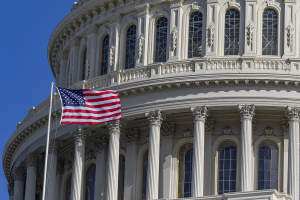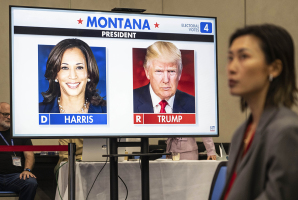Immigration Reform and Southern Baptists
News reports in both the national print and electronic media have unfortunately sown some confusion over where Southern Baptists, and I, stand on the question of immigration reform.
Like most Americans, Southern Baptists and other Evangelicals continue to search for a morally responsible way to address the growing immigration crisis while honoring the rule of law.
To date, legislation offering truly comprehensive immigration reform—legislation that will garner the support of a critical mass of Southern Baptists and other Evangelicals—has yet to be written and introduced in Congress.
Immigration reform that is "truly" comprehensive and will earn my support will square with the points covered in a resolution overwhelmingly adopted by Southern Baptists' elected messengers meeting at their annual convention in June 2006.
The reform would:
• Insure the federal government provides for U.S. security "by controlling and securing our borders";
• Enforce immigration laws, including oversight of the hiring practices of private employers;
• Deal judiciously and "realistically" with those in the country illegally; and,
• Allow the people of God to act "redemptively," reaching out to meet the physical, emotional, and spiritual needs of all immigrants as they work toward an earned pathway of "legal status and/or citizenship."
If I were a U.S. Congressman or Senator, I would not support any immigration bill that has yet been introduced. Each of the bills falls short in some critical areas.
Senate measures have been too lenient and have not adequately addressed border security. The House bill, which gained passage in the last session, was inadequate in that it focused almost exclusively on border security and failed to position the government to deal "realistically with the immigration crisis in a way that would restore trust among the citizenry," as the SBC resolution urges.
The legislation that will generate majority support among Southern Baptists and other Evangelicals is still out there waiting to be written and introduced in the Congress.
It is imperative that Congress—consistent with national sovereignty and with our national security—expeditiously find a way to resolve this moral problem in a moral way in line with the ideals of our nation.
I am in favor of a measure that includes controlling the borders and enforcing immigration laws inside the country, while offering no amnesty for lawbreakers. This is my position and the position that emerges from any fair and objective reading of the SBC resolution.
The term "comprehensive legislation" is not code for amnesty, no matter what my critics contend. Webster defines amnesty as the "act of an authority (as a government) by which pardon is granted to a large group of individuals." Amnesty is wiping a transgressor's record clean—it is a free ride.
Proper reform should consist of a "guest-worker" program that requires an illegal immigrant to undergo a criminal background check, pay a fine, agree to pay back taxes, learn English, and get in line behind those who have legally migrated into this country in order to apply for permanent residence after a probationary period of years. Amnesty? Hardly.
To call any proposed requirement—that individuals must learn to read and write and speak English and go through a rigorous process in order to earn their way out of a lengthy period of "probation" in order to apply for legal status—"amnesty" is to do violence to the English language.
One must not only learn how to read, write, and speak English properly; one must use the language as it was intended. Words have agreed upon meanings. One cannot change the meanings of words arbitrarily. Penalties, probation, and requirements do not equal "amnesty."
My position and the position of most Southern Baptists with whom I have spoken on this issue embraces the thought that if these immigrants choose to travel on a "path of legal status and/or citizenship," it must include certain financial, time, and other requirements. Amnesty? Hardly.
As reflected in the resolution on immigration that was overwhelmingly adopted at the Southern Baptist Convention meeting last June in Greensboro, N.C., and as I said in a press conference March 29, 2007, in Washington, D.C., on the topic of immigration, Southern Baptists will not embrace reform that is not committed to securing the borders.
As U.S. citizens, we have a right to expect the federal government to enforce the laws regarding who crosses our borders. Border security is a question of national sovereignty, national security, and the government fulfilling its divinely mandated responsibility to enforce the law (Romans 13:1-7).
While the government focuses on enforcing the law, Christians are mandated to forgive and to act redemptively within their communities toward all people, including illegal immigrants. As citizens of the Lord's heavenly Kingdom, we have a divine mandate to respond compassionately toward those who are in need.
At the March 29 press conference, I not only cited extensively the SBC resolution on the immigration crisis, I also handed out copies of a first-person commentary on the issue that was published in Baptist Press (04/27/06), well prior to the Convention's adoption of the resolution in June of that year.
I was asked by a USA Today reporter following that press conference if my position on this issue was not somewhat ahead of where "some" of the people in the pew were. I agreed that I might be "a little bit ahead" of where some Southern Baptists are vis-à-vis this issue, but I noted voting messengers at the Southern Baptist Convention adopted the resolution on the immigration crisis with near unanimity and with no debate.
For the record, I did not say, and did not acknowledge, that I was "a little bit ahead" of where the Convention was. In fact, I was at the press conference representing what the Convention had said on the issue.
Once again I am reminded that it is usually far better to speak for yourself than to leave it to others to write about what you supposedly said.
If I were in Congress I would look to the SBC resolution on immigration reform as a blueprint and plumb line for writing truly comprehensive immigration reform. None of the legislation currently being proposed or considered in the Congress comes anywhere close to rising to the standard set by our Convention's messengers last June.
I remain determined to do my best to ensure that Southern Baptists and I are not misunderstood on this critical issue, in spite of how we are sometimes portrayed in the mainstream media. To understand better Southern Baptists' views on this issue, I urge you to look to our Web site, erlc.com, and Baptist Press, and not rely solely on national press reports.
____________________________________________________________
Dr. Richard Land is president of The Ethics & Religious Liberty Commission, the Southern Baptist Convention's official entity assigned to address social, moral, and ethical concerns, with particular attention to their impact on American families and their faith.




























